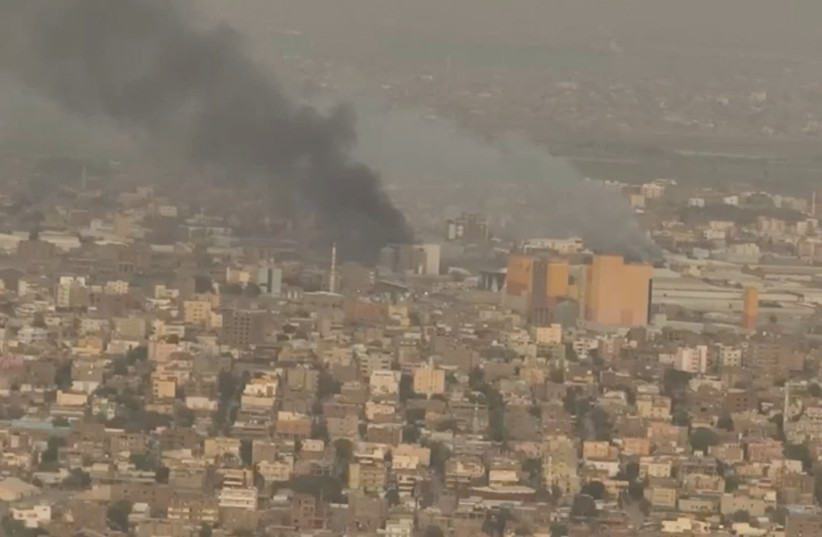Sudan's army and a paramilitary force battled on the outskirts of the capital on Wednesday, eroding a truce in an 11-day conflict that civilian groups fear could revive the influence of those loyal to ousted autocrat Omar al-Bashir.
Fueling those concerns, the army confirmed the transfer of Bashir from Khartoum's Kober prison to a military hospital, along with at least five of his former officials, before hostilities started on April 15.
Over the weekend, thousands of inmates were freed outright from prison, including a former minister in Bashir's government who, like him, is wanted on war crimes charges by the International Criminal Court in The Hague.
At least one other of the group transferred to hospital is wanted by the ICC.
Bashir's three-decade reign came to an end four years ago. He has been in prison, with spells in hospital, on Sudanese charges related to the 1989 coup that brought him to power.

"This war, which is ignited by the ousted regime, will lead the country to collapse," said Sudan's Forces of Freedom and Change (FCC), a political grouping leading an internationally-backed plan to transfer to civilian rule.
The plan was derailed by the eruption of fighting between the army and the paramilitary Rapid Support Forces (RSF).
The two sides and the FCC missed an April deadline to launch the transition to democracy, largely over disputes about merging the security forces.
Civilian groups have blamed groups loyal to Bashir of seeking to use conflict to find a way back to power and influence. The RSF, whose leader General Mohamed Hamdan Dagalo climbed to power under Bashir but later dumped him, has strongly opposed the Islamists who backed the former army autocrat.
The fighting "will not solve the main issues that civilian and military parties were trying to solve through the political process, especially the security and military reforms, which will … lead to one professional unified army," the FCC added in its statement.
Reuters could not immediately establish the circumstances of the release and transfer of former officials and convicted criminals, with different factions blaming each other for opening prison gates.
The fighting has turned residential areas into battlefields. Air strikes and artillery have killed at least 459 people, wounded more than 4,000, destroyed hospitals and limited food distribution in a nation where a third of its 46 million people rely on humanitarian aid.
In Khartoum, which together with its sister cities is one of Africa's largest urban areas, the prisoner release added to a growing sense of lawlessness. Residents have reported worsening insecurity, with widespread looting and gangs roaming the streets.
Foreigners who have fled the city have described bodies littering the streets, buildings and factories on fire and youths carrying large knives to protect themselves.
Palestinian medical student Khamis Jouda, at the border with Egypt, said even growing up in conflict in Gaza Strip, he had never experienced the violence he saw last week in Khartoum.
"We didn't expect to see warplanes and drones bombing in internal fighting," said Jouda, 25. Everyone feared for his life."
Thousands of diplomats, foreign citizens evacuated from Sudan
Foreign powers have evacuated thousands of diplomats and private citizens in recent days, including 1,674 from 54 countries helped out by Saudi Arabia.
Sudanese along with citizens of neighboring countries have also been leaving en masse. More than 10,000 people crossed into Egypt from Sudan in the past five days, authorities in Cairo said, adding to an estimated 20,000 who have entered Chad. Others have fled to South Sudan and Ethiopia, despite difficult conditions there.
Bashir was ousted in a popular uprising in 2019. Two years later, the army led by General Abdel Fattah al-Burhan, with support from the RSF, took over in a coup.
The whereabouts of Bashir came into question after a former minister in his government, Ali Haroun, announced on Tuesday he had left Kober prison with other former officials.
The ICC in The Hague has accused Bashir of genocide, and Haroun of organizing militias to attack civilians in Darfur in 2003 and 2004.
The ICC declined to comment on the transfer from prison of Bashir, Haroun and a third wanted former official, Abdel Raheem Muhammad Hussein.
Thousands of convicted criminals, including some sentenced to death, were held in the prison, which dates back to British colonial rule, along with senior and lower-ranking officials from the Bashir regime.
The police said paramilitary gunmen had stormed into five prisons over the weekend, killing several guards and opening the gates. The RSF blamed authorities for letting Haroun and others out.
Wednesday's renewed battles were mostly in Omdurman, one of Khartoum's twin cities, where the army was fighting reinforcements to the RSF brought in from other regions of Sudan, a Reuters reporter said.
The army and the RSF agreed to a three-day truce, due to end late on Thursday, after diplomatic pressure from the United States and Saudi Arabia. The army has accused its rivals of using the lull to replenish supplies of men and weapons.
Thanks to the ceasefire, fighting between army soldiers the RSF remained more subdued in the center of Khartoum.
UN special envoy on Sudan Volker Perthes told the UN Security Council on Tuesday that the ceasefire "seems to be holding in some parts so far."
But he said that neither party showed readiness to "seriously negotiate, suggesting that both think that securing a military victory over the other is possible."
